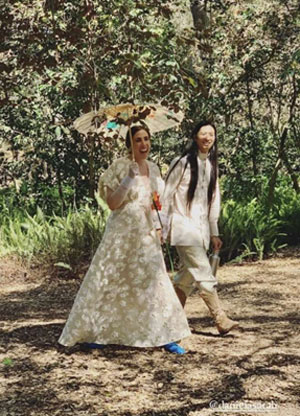A Harmony
A harmony that does not rely on exclusion for its sweetness
When I became a Bat Mitzvah on Earth Day in 1995 in Los Angeles, I chanted and gave a d’var torah on the parsha about how the Jews are the chosen people. I am ashamed that I don’t remember the name of the parsha — Cantor Wunch and Aviva please chime in— and I spent an embarrassing amount of time trying to google it to no avail.
The Cantor gave me cassette tapes of my parsha which I listened to diligently on my walkman, with headphones, sprawled on my bed with books and binders after school. Some days I could hear the muffled morse code of my brother Avi’s drums as he practiced in the garage, or my mother’s voice echoing off of the kitchen tile as she took a phone call on the landline, the extra long phone cord…
I loved these private study sessions. I loved getting lost in the trope, the melisma of the melodies, the words taking form as I repeated them over and over, rewinding and replaying the cassette.
But then came the meetings with the Rabbi. Having read the translation of my parsha, this text that I so loved chanting alone in my after-school bedroom, I wrote an essay challenging and refuting the notion that Jews are the chosen people. Where does that leave the rest of humanity? I mused. I submitted my essay to the Rabbi, and he asked me to re-write it, to omit the parts where I challenge this notion of chosen-ness.
I did as he instructed. I submitted a revised essay. It was approved. Then on the day I was called to the Torah as a Bat Mitzvah, in front of my family, my friends, my congregation, I read my original essay, my slightly defiant essay. I also wrote and recited a poem detailing my experience watching my Bubbe Fanny, may she rest in peace, return to the site of the mass grave outside of Zasliai Lithuania where her father and sister and her sister’s children were likely murdered. And I sang my parsha, the haftorah, a duet with the cantor, and every possible extra credit piece of liturgy with the exact spirit that I bring to our services today, albeit with a slight valley girl inflection.
Ultimately, the Rabbi shook my hand and congratulated me, and I could tell he was irked but that he ultimately respected my disobedience. Over many years I have learned that these aspects of my character— to question endlessly, to not accept the letter of the law if it seems to me to be incompatible with the spirit of the law— this is who I am.
When I told our Rabbi Emerita Aviva Goldberg that a) Eric and I wished for her blessing on our union today; and b) that I wanted to say some words about the chazzan marrying a non-Jew with no intention to convert, she wrote the following in an email to me: “Of course, I will be honoured to bless you both. Now, do you feel you need to explain your choice of marrying a non-Jew? Frankly it is no one’s business – you love him – he loves you – you respect him – he respects you – he understands who you are and you understand who he is – he honours your principles, your ideals, your traditions and likewise you his, so?”
It was just the kind of frankness, openness, forthrightness, acceptance, and take-no-BS attitude that we have all grown to love and rely upon in our expression of our Jewishness here at Shir Libeynu— the path and legacy bravely carved by Aviva and our congregants over these past few decades. It is why this congregation is invaluable to me and to so many others— it is a place of non-conformity, and of each person finding and sharing their full wingspan.
I had nearly forgotten the security that such a radical acceptance affords — I had been researching Cantorial and Rabbinic programs and my heart would sink and my anger would rise as I would discover that a great many of them still have as part of their policy a “need not apply” restriction for any applicants partnered or married to non-Jews. Or when, for example, the first time Eric was going to meet my father and we went for dinner, we happened to run into my childhood Cantor. When I introduced Eric to the Cantor, his first question for Eric was “Where are you from?”—a racist micro aggression that made us both squirm.
And so, no, I don’t feel that I need to explain my choice— the ease, respect, admiration, love and passion Eric and I feel for one another speak volumes— but I do want to mark this moment to say that I am so grateful to Shir Libeynu for being the kind of place that welcomes Eric and me, and countless other families just like us, with open arms, and without caveats. And I’m glad that this inclusivity means that I get to introduce you all to a person whom I love dearly, whom my friends describe as:
Top shelf.
Prince Eric.
Magical Man.
The best person I know. Upright.
Don’t let this one go. Hold on tight.
And who exudes ease, warmth, softness, goodness and stirs those qualities deep within me.
Who shows as much interest in spontaneous kitchen dance parties as in moments of challenge or impasse. Who is kind and welcoming, but always aware of the hidden currents. Who holds fast to his values and his compass. Who is appropriately skeptical, but with endless acceptance and curiosity about the parts of life that require a suspension of disbelief.
Eric and I, and indeed all of us at Shir Libeynu, are lucky enough to enjoy a harmony that does not rely on exclusion for its sweetness. Shabbat shalom.
Daniela Gesundheit
